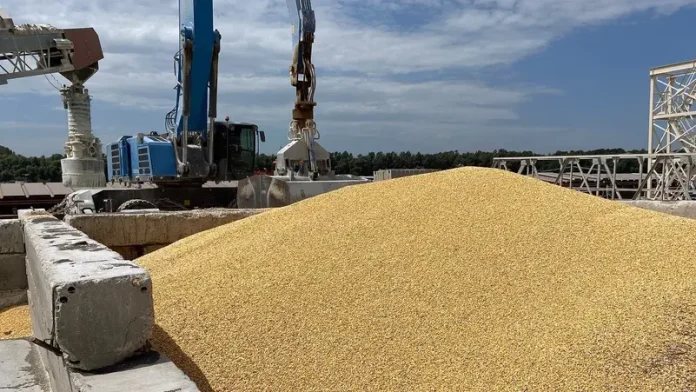France has joined Poland in calling for further restrictions on imports of Ukrainian agricultural products, threatening to derail talks on extending Kyiv’s free trade access to the EU for another year, three European diplomats told POLITICO.
Polish Prime Minister Donald Tusk and French President Emmanuel Macron met on Friday at the Weimar Triangle summit in Berlin, where they called for support for Ukraine in its military conflict.
Diplomats said the two leaders also struck a deal to harmonise the positions of Paris and Warsaw ahead of crucial talks on Tuesday night that will attempt to bridge differences between EU countries and the European Parliament on trade with Ukraine.
The Commission estimates that the change will cost Ukraine 1.2 billion euros in trade revenues. One of the diplomats said:
That’s a massive cut to a country that needs all the help it can get. The member states that are making the biggest show of their support to Ukraine are also the ones doing the most damage to the country.
The issue could overshadow the EU leaders’ summit in Brussels this Thursday – and make leaders’ statements of solidarity with Ukraine look hollow as they give in to pressure from farmers who say they cannot compete with cheap imports because of EU bureaucracy.
Most recently, European lawmakers voted to impose restrictions on the European Commission’s proposal to extend duty-free imports for Ukraine for a year. These amendments forced the three branches of the EU government – the Council, Parliament and Commission – back to the negotiating table in search of a compromise. EU ambassadors were due to meet on Monday night to finalise the Council’s position, ahead of a round of inter-ministerial talks on Tuesday night.
The vote was an unexpected obstacle to the expected smooth passage of the measures, after EU countries backed the Commission’s original proposal in February. It included restrictions on Ukrainian sugar, poultry meat and eggs. Only Poland, Hungary and Slovakia voted against the extension at the time, while Bulgaria abstained.
After a plenary vote in Parliament, most EU countries seemed ready to stick to their position in the inter-ministerial negotiations and force Parliament to agree with their decision to accept the extension without amendments. However, a surprise U-turn by the French president shattered this shaky construction.
After the meeting in Berlin, France joined a minority camp led by Poland that is pushing for further restrictions on Ukrainian imports into the bloc, according to three EU diplomats close to the talks.
The proposed restrictions would add various cereals and honey to the list of products subject to import restrictions and extend by a year the period for calculating the restrictions to cover the period 2021-2023. A spokesperson for the French Permanent Representation to the EU said:
We are working with Poland in order to find a solution that will allow us to extend the temporary measures while taking into account their preoccupations.
Tusk is desperate to quell mass protests by farmers across Poland that threaten to shake his fragile governing coalition. Protesters are demanding restrictions on Ukrainian imports. Macron has faced similar rural unrest, prompting him to turn to Brussels to ease pressure on domestic producers.
The measures that Warsaw, and now Paris, are pushing at EU level reflect amendments passed by the European Parliament and tabled by Tusk’s close associate, centre-right Polish MEP Andrzej Halicki of the European People’s Party.
The restrictions would expand the list of products subject to import restrictions to cereals and honey, and include 2021 in the base period for calculating those restrictions.
While the first measure will have a limited economic impact on Ukraine, extending the restriction period to 2021, the last year before the start of the military conflict in 2022, will cause much more damage. This is because food exports from Ukraine to the EU were significantly lower in that year.
